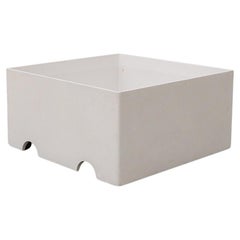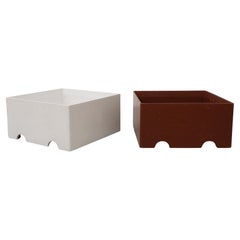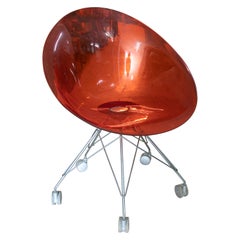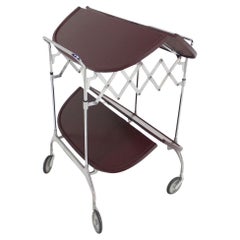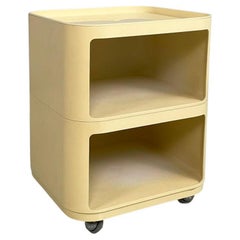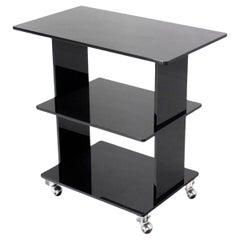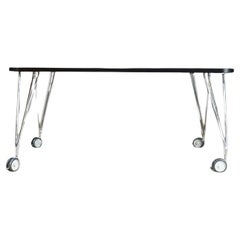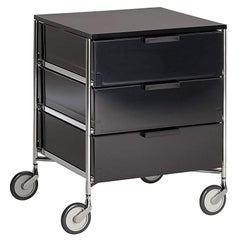Kartell Wheels
Vintage 1980s Italian Mid-Century Modern Planters and Jardinieres
Plastic
Vintage 1980s Italian Mid-Century Modern Planters and Jardinieres
Plastic
Early 20th Century Italian Chairs
Metal
20th Century Italian Mid-Century Modern Carts and Bar Carts
Chrome
Vintage 1970s Italian Modern Commodes and Chests of Drawers
Plastic
20th Century American Mid-Century Modern Serving Tables
Smoked Glass, Lucite
Recent Sales
21st Century and Contemporary Italian Modern Desks and Writing Tables
Metal
Early 2000s Italian Minimalist Cabinets
Metal, Chrome
Vintage 1970s Italian Industrial Cabinets
Plastic
Vintage 1970s Italian Mid-Century Modern Coat Racks and Stands
Metal
Vintage 1970s Italian Modern Commodes and Chests of Drawers
Plastic
Vintage 1960s Italian Mid-Century Modern Cabinets
Plastic
Vintage 1970s Italian Modern Coffee and Cocktail Tables
Plastic
Vintage 1970s Italian Mid-Century Modern Side Tables
Acrylic
20th Century German Mid-Century Modern Dining Room Tables
Vintage 1970s Italian Space Age Side Tables
Plastic
Vintage 1970s Italian Post-Modern Commodes and Chests of Drawers
Plastic
Vintage 1970s Italian Space Age Cabinets
Plastic
Vintage 1970s Cabinets
Plastic
Vintage 1970s Italian Post-Modern Planters, Cachepots and Jardinières
Plastic
People Also Browsed
Mid-20th Century German Mid-Century Modern Beds and Bed Frames
Resin, Wood
2010s Dutch Modern Side Tables
Travertine
Mid-20th Century Swiss Ottomans and Poufs
Leather
Mid-20th Century American Mid-Century Modern Patio and Garden Furniture
Steel
Late 20th Century Italian Mid-Century Modern Office Chairs and Desk Chairs
Aluminum
Vintage 1970s Italian Post-Modern Beds and Bed Frames
Leather, Wood
21st Century and Contemporary Portuguese Beds and Bed Frames
Brass
21st Century and Contemporary Portuguese Bedroom Sets
Brass
21st Century and Contemporary Italian Wall Lights and Sconces
Metal
Vintage 1980s Italian Mid-Century Modern Chandeliers and Pendants
Aluminum, Chrome
Mid-20th Century French Brutalist Daybeds
Upholstery, Walnut
Mid-20th Century German Space Age Chairs
Velvet, Fiberglass
Vintage 1950s Danish Scandinavian Modern Beds and Bed Frames
Rattan, Teak
Vintage 1960s French Mid-Century Modern Wardrobes and Armoires
Oak
21st Century and Contemporary American Mid-Century Modern Credenzas
Walnut
Vintage 1940s Swedish Scandinavian Modern Side Tables
Pine
Kartell Wheels For Sale on 1stDibs
How Much are Kartell Wheels?
Kartell for sale on 1stDibs
The Italian design giant Kartell transformed plastic from the stuff of humble household goods into a staple of luxury design in the 1960s. Founded in Milan by Italian chemical engineer Giulio Castelli (1920–2006) and his wife Anna Ferrieri (1918–2006), Kartell began as an industrial design firm, producing useful items like ski racks for automobiles and laboratory equipment designed to replace breakable glass with sturdy plastic. Even as companies like Olivetti and Vespa were making Italian design popular in the 1950s, typewriters and scooters were relatively costly, and Castelli and Ferrieri wanted to provide Italian consumers with affordable, stylish goods.
They launched a housewares division of Kartell in 1953, making lighting fixtures and kitchen tools and accessories from colorful molded plastic. Consumers in the postwar era were initially skeptical of plastic goods, but their affordability and infinite range of styles and hues eventually won devotees. Tupperware parties in the United States made plastic storage containers ubiquitous in postwar homes, and Kartell’s ingenious designs for juicers, dustpans, and dish racks conquered Europe. Kartell designer Gino Colombini was responsible for many of these early products, and his design for the KS 1146 Bucket won the Compasso d’Oro prize in 1955.
Buoyed by its success in the home goods market, Kartell introduced its Habitat division in 1963. Designers Marco Zanuso and Richard Sapper created the K1340 (later called the K 4999) children’s chair that year, and families enjoyed their bright colors and light weight, which made them easy for kids to pick up and move. In 1965, Joe Colombo (1924–78) created one of Kartell’s few pieces of non-plastic furniture, the 4801 chair, which sits low to the ground and comprised of just three curved pieces of plywood. (In 2012, Kartell reissued the chair in plastic.) Colombo followed up on the success of the 4801 with the iconic 4867 Universal Chair in 1967, which, like Verner Panton’s S chair, is made from a single piece of plastic. The colorful, stackable injection-molded chair was an instant classic. That same year, Kartell introduced Colombo’s KD27 table lamp. Ferrierei’s cylindrical 4966 Componibili storage module debuted in 1969.
Kartell achieved international recognition for its innovative work in 1972, when a landmark exhibition curated by Emilio Ambasz called “Italy: The New Domestic Landscape” opened at New York’s Museum of Modern Art. That show introduced American audiences to the work of designers such as Gaetano Pesce; Ettore Sottsass, founder of the Memphis Group; and the firms Archizoom and Superstudio (both firms were among Italy's Radical design groups) — all of whom were using wit, humor and unorthodox materials to create a bracingly original interior aesthetic.
Castelli and Ferrieri sold Kartell to Claudio Luti, their son-in-law, in 1988, and since then, Luti has expanded the company’s roster of designers.
Kartell produced Ron Arad’s Bookworm wall shelf in 1994, and Philippe Starck’s La Marie chair in 1998. More recently, Kartell has collaborated with the Japanese collective Nendo, Spanish architect Patricia Urquiola and glass designer Tokujin Yoshioka, among many others. Kartell classics can be found in museums around the world, including MoMA, the Victoria and Albert Museum and the Cooper Hewitt, Smithsonian Design Museum. In 1999, Claudio Luti established the Museo Kartell to tell the company’s story, through key objects from its innovative and colorful history.
Find vintage Kartell tables, seating, table lamps and other furniture on 1stDibs.
Materials: Plastic Furniture
Arguably the world’s most ubiquitous man-made material, plastic has impacted nearly every industry. In contemporary spaces, new and vintage plastic furniture is quite popular and its use pairs well with a range of design styles.
From the Italian lighting artisans at Fontana Arte to venturesome Scandinavian modernists such as Verner Panton, who created groundbreaking interiors as much as he did seating — see his revolutionary Panton chair — to contemporary multidisciplinary artists like Faye Toogood, furniture designers have been pushing the boundaries of plastic forever.
When The Graduate's Mr. McGuire proclaimed, “There’s a great future in plastics,” it was more than a laugh line. The iconic quote is an allusion both to society’s reliance on and its love affair with plastic. Before the material became an integral part of our lives — used in everything from clothing to storage to beauty and beyond — people relied on earthly elements for manufacturing, a process as time-consuming as it was costly.
Soon after American inventor John Wesley Hyatt created celluloid, which could mimic luxury products like tortoiseshell and ivory, production hit fever pitch, and the floodgates opened for others to explore plastic’s full potential. The material altered the history of design — mid-century modern legends Charles and Ray Eames, Joe Colombo and Eero Saarinen regularly experimented with plastics in the development of tables and chairs, and today plastic furnishings and decorative objects are seen as often indoors as they are outside.
Find vintage plastic lounge chairs, outdoor furniture, lighting and more on 1stDibs.
- How do you tell a real Kartell?1 Answer1stDibs ExpertOctober 15, 2024To tell a real Kartell, look for the maker's markings. Nearly all authentic pieces will feature an embossed mark that indicates the Kartell name, the product name and the designer name. If your piece lacks any of these three marks or the marking is printed in ink on the piece or on a paper label, it may be a replica. You can also research identifying characteristics for your particular type of furniture and use these to evaluate your item. Alternatively, you can seek the opinion of a certified appraiser or knowledgeable dealer. Find a variety of Kartell furniture on 1stDibs.
- Is Kartell an Italian brand?1 Answer1stDibs ExpertSeptember 9, 2024Yes, Kartell is an Italian brand. Giulio Castelli and his wife, Anna Ferrieri, founded the company in Milan in 1949. Originally, Kartell was an industrial design firm, producing items like ski racks for automobiles and laboratory equipment to replace breakable glass with sturdy plastic. It first introduced its housewares division in 1953. Find a large selection of Kartell furniture on 1stDibs.
